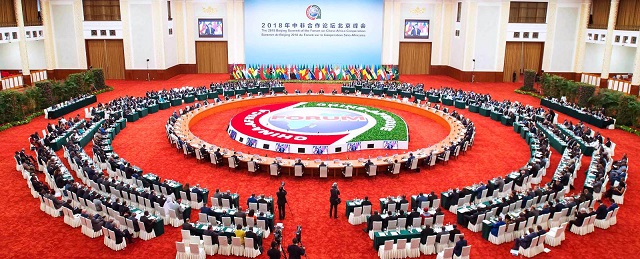
To enhance the impact of the Forum on China-Africa Cooperation, African countries need a more coherent strategy of engagement with China along with increased public transparency, awareness, and citizen agency
ANALYSIS | PAUL NANTULYA | The Ninth Forum on China-Africa Cooperation (FOCAC), to be held in Beijing starting September 4 to 6, takes place at a critical juncture. African economies are still distressed from the instability caused by the COVID-19 pandemic, and anger is growing over the economic consequences of unsustainable debt, some of which is manifested in popular protests. Young people are demanding equity, fairness, and transparency—including in African governments’ relations with external powers. Governments are also facing pressure to make good on their commitment to move their economies up the value chain and shift their focus from aid to trade.
The Dakar Action Plan (2022-2024), a product of the Eighth FOCAC summit held in Dakar, Senegal, in November 2021, offered a comprehensive plan for trade promotion and facilitation, strategic market access, and product value addition. China committed to importing $300 billion worth of goods from Africa between 2022 and 2024. It also offered $10 billion to improve the quality of African exports and a credit line of $10 billion to help small- and medium-sized enterprises export high-quality products into Chinese markets. Yet, monitoring these commitments is difficult, and it is unclear if, or when, these targets will be met.
While FOCAC has emerged as a unique forum, it is still by-and-large shaped by a donor-recipient dynamic, where African countries mostly take a back seat while China initiates much of the agenda. Part of this has to do with weaknesses in strategic planning on the African side. While China regularly releases comprehensive Africa strategy documents—such as the white papers of 2006, 2015, and 2021—African countries have little coherent strategy for China.
China produced its China-Africa Cooperation Vision 2035 shortly after the Dakar summit. Developed with contributions from African countries, the document incorporates priorities of the African Union’s (AU) Agenda 2063, particularly on development partnerships, trade and investment, green growth, human resource development, and industrialization. Curiously though, African countries did not craft their own document articulating Africa’s interests and detailing how the China-Africa Vision 2035 could advance their national development plans.
China, by contrast, is crystal clear about its objectives. The China-Africa Vision 2035 is aligned with China’s own Vision 2035, which seeks to consolidate China’s status as a Great Power. A careful reading of both documents shows that China views its engagement with African countries as an avenue through which it can advance its quest for Great Power status—a means to an end.
FOCAC—and China-Africa policy more generally—is frequently criticized for being top-heavy and overwhelmingly focused on state-to-state relations. Much of FOCAC occurs outside public view and beyond the reach of independent experts. This excludes many important African stakeholders. It also hinders effective oversight. This is one reason why FOCAC outcomes are difficult to quantify, monitor, evaluate, and improve. Calls from African citizens are growing for African governments to address these and other shortcomings to ensure that ordinary Africans derive maximum value from an initiative that likes to portray itself as a model of “win-win cooperation.”
A process rather than a collection of Ad hoc summits
The FOCAC summit meets once every 3 years alternating between China and Africa. The only other African summit with external actors that meets this regularly is the Tokyo International Conference on African Development (TICAD), which has also met eight times since its launch. The Ninth FOCAC will use a slightly different layout from previous ones as it will be organized around thematic committees co-chaired by China and an African country. The Chinese representation will most likely come from China’s FOCAC follow-up committee, comprising 37 Chinese agencies. The FOCAC gathering culminates a sequence of agenda-setting engagements starting with the African diplomatic corps in Beijing, a senior officials meeting that packages proposals, a ministerial conference to refine them, and finally the FOCAC summit.
A China-Africa Entrepreneurs Forum for African private sector leaders will be part of FOCAC this time around. Several related meetings took place in the lead-up to the summit, including the China-Africa Economic and Trade Cooperation Forum in March 2024 in Dar es Salaam, Tanzania. African countries including Kenya, Namibia, and Uganda also organized their own investment forums to market opportunities to Chinese investors ahead of the summit.
This year’s FOCAC was also preceded by the China-Africa Think Tanks Forum in April 2024, also in Dar es Salaam, and the Second High-Level Conference of the Forum on Global Action for Shared Development in Beijing in July.
FOCAC conducts most of its business through thematic and technical subforums. Examples include the China-Africa Peace and Security Forum, the Forum on China-Africa Local Government Cooperation, and the China-Africa Legal Forum. The China-Africa Peace and Security Fund channels Chinese finance and equipment toward the African Peace and Security Architecture while the Ministerial Forum on China-Africa Health Cooperation places Chinese health expertise at the disposal of African health ministries.
Some of these subforums have achieved significant milestones since the Eighth FOCAC. The China-Africa Economic and Trade Expo (CAETE) opened new trade between African countries and Chinese cities and municipalities resulting in 74 cooperative projects. This has contributed to the robust China-Africa trade portfolio of $282 billion in 2023. Under this program, Kenya has become Africa’s largest exporter of flowers to China, valued at over $800 million annually.
African countries have also taken advantage of CAETE’s promotion of e-shopping platforms. In January 2022, for instance, 11,000 bags of Ethiopian coffee were sold in 5 seconds using such platforms. Rwanda, Mauritius, and other African countries have followed suit and used similar platforms to secure niche markets. All told, FOCAC offers lessons to other external actors’ engagements in Africa in terms of the regularity of its summits, institutional layout across different areas of cooperation, technical and political coordination between summits, and innovation.
Still, FOCAC continues to encounter controversies. To start, it is viewed as serving primarily Chinese interests. Take the China-Africa Think Tanks Forum. Its “Dar es Salaam Consensus,” a document issued in April 2024 to influence the forthcoming Ninth FOCAC agenda, commits member think tanks, scholars, and research organizations to champion and implement the Global Development Initiative and Global Security Initiative—two Chinese national security concepts. The meeting was silent on key African demands such as the 2005 Ezulwini Consensus, which among other things calls for African permanent representation on the United Nations Security Council.
China’s engagements in Africa have also attracted criticism in recent years for increasing Africa’s debt burden. Chinese lending in Africa ballooned fivefold to $696 billion between 2000, when FOCAC was established, and 2020. Chinese lenders now account for 12 percent of Africa’s public and private debt, making China a central actor in the debate on African debt sustainability and responsible borrowing. China, however, tends not to entertain debt forgiveness or cancellation, as highly indebted countries like Angola, Ethiopia, Kenya, and Zambia have discovered.
FOCAC also remains heavily regime centric. Hence it lacks broad-based public consultation and engagement. The creation of subforums for nongovernmental organizations (NGOs) such as the China-Africa Press Center and China-Africa People’s Forum has not resolved this problem since participants are rigorously vetted by government and ruling party officials. Indeed, the government allocation of Chinese conferencing and training opportunities are in many ways part of the largesse that is distributed as part of ruling parties’ patronage structures.
Enhancing African Agency
FOCAC’s reliance on state-to-state dialogue persists despite the expansion in academic, think tank, and civil society expertise of Africa-China relations.
Independent African voices are weighing in on Africa-China policy debates, especially at the AU, which remains open to seeking outside perspectives. The nonprofit China-Global South Project organizes weekly podcasts with top thought leaders to discuss pertinent Africa-China policy issues. Meanwhile the Africa-China Reporting Project works to improve the quality of reporting on Africa-China relations. The Afro-Sino Center of International Relations and the Development Reimagined research centers both follow and interrogate the FOCAC process. Moreover, the Africa-China Independent Working Group of Scholars assembles top scholars and practitioners to explore new ways of thinking on Afro-Sino relations and shape African strategies.
One notable outcome of such efforts is a ground-breaking study, “Towards an African Policy on China,” released as a resource for African negotiators by South Africa’s Institute for Global Dialogue ahead of the 2018 FOCAC summit. An African-run initiative at the Blavatnik School of Government at Oxford University brings African negotiators from different countries together to share notes and identify lessons for negotiating more effectively with Chinese officials. The 600-member Chinese in Africa and Africans in China Research Network—the world’s largest independent platform of Africa-China researchers and thought leaders—coordinates seminars, new research, and public policy engagements. The network also manages a database of scholars and experts with China experience.
These resources are relevant since part of the reason why Africa has been perpetually on the backfoot in their engagements with China is African governments’ failure to tap the vast amount of African cultural and linguistic expertise of China that exists on the continent. Prior to COVID, 60,000 degree-seeking African students travelled to China annually to pursue further studies. Yet, African governments have largely not engaged these resources to improve the continent’s overall understanding and engagement with China.
The run up to the Ninth FOCAC has seen a high level of organized advocacy and engagement by civic and academic leaders, independent experts, and NGOs. Their policy recommendations can be grouped into eight broad themes:
1. Take greater initiative and leadership by developing and advancing a coherent Africa strategy toward China.
2. Instead of having 54 heads of state marching into each meeting with an external partner, the continent should create task forces with smaller groups of countries representing Africa in each summit with external actors. These can be organized thematically and accentuate African expertise by rationalizing the division of labor. Convene a meeting of senior African officials akin to the Community of Latin American and Caribbean States (CELAC) National Coordinators Meeting to harmonize positions ahead of FOCAC.
3. De-emphasize aid and focus on trade, preferential market access, the targeting of niche markets, and aggressive product value addition.
4. Push for technology transfer, especially in green energy and green growth.
5. Align education and training with Africa’s human resource needs.
6. Enhance oversight by establishing an ongoing dialogue platform between FOCAC summits that includes outside voices and experts, relevant parliamentary oversight committees, and independent China caucuses.
7. Tap available outside expertise, including the growing community of China-trained African professionals.
Elevating Citizen Interests at FOCAC
Africa has benefitted from FOCAC, but more proactive engagement is needed. African engagements tend to be ad hoc and poorly structured, putting the continent at a distinct disadvantage. African countries must become more strategic, include nongovernmental voices, be mindful of the pitfalls of unrestrained and unaccountable borrowing, and, by establishing more transparency of FOCAC agreements, ensure that African representatives place national interests ahead of personal ones.
There is a need for enhanced, independent monitoring mechanisms in between FOCAC summits to take stock of commitments, identify problems and areas of improvement, and ensure that benefits accrue to ordinary citizens, who rightly demand a greater say and accountability in how their governments engage foreign partners. Above all, there must be a realization that China, or any other actor, cannot develop Africa. Africa will develop through its own sweat and effort. Relationships with external partners must be managed with that understanding.
****
Source: Africa Centre for Strategic Studies
 The Independent Uganda: You get the Truth we Pay the Price
The Independent Uganda: You get the Truth we Pay the Price




